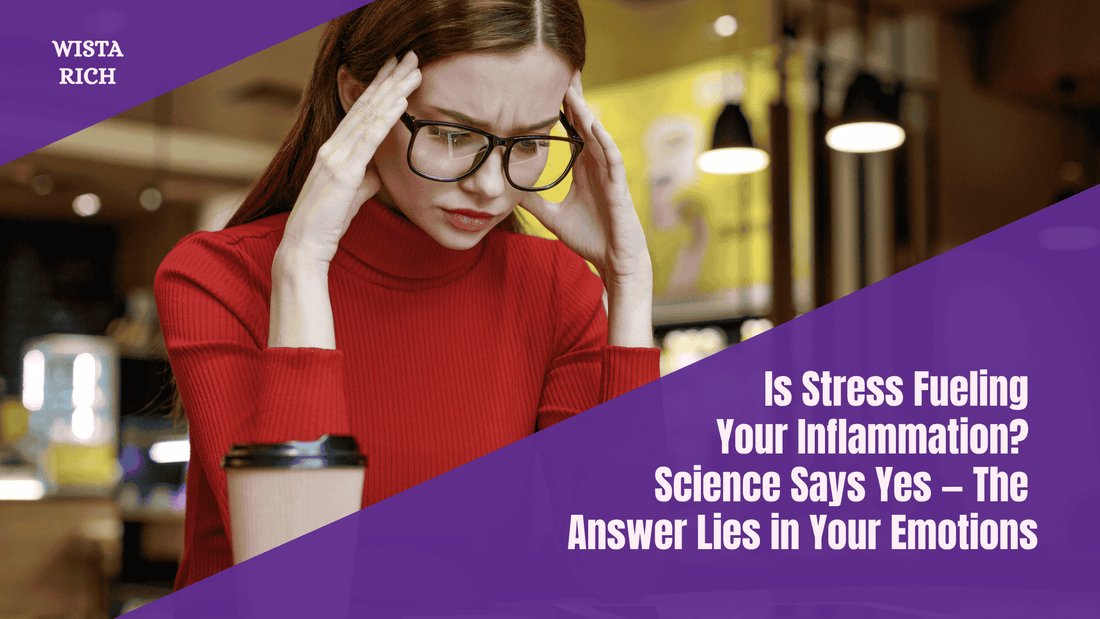
Is Stress Fueling Your Inflammation? Science Says Yes—The Answer Lies in Your Emotions July 4, 2025
Share
Ever felt like your body was rebelling after a stressful week—achy joints, digestive upset, or just an overall sense of feeling "off"? You’re not imagining things. More and more research is revealing that our emotions, particularly chronic stress and emotional pressure, are deeply intertwined with our physical health. One surprising link? Chronic inflammation. Yes, the same process involved in conditions like heart disease, diabetes, and even cancer.
Let’s break down how your emotional world might be quietly fanning the flames inside your body.
1. What Is Chronic Inflammation, Anyway?
Inflammation isn’t always the bad guy. In fact, it’s your body’s natural defense mechanism—think of it like your internal emergency response team. Got a cut or a cold? Inflammation kicks in to heal and protect.
But when inflammation becomes chronic, it sticks around even when there’s no injury or infection. Like an alarm that never turns off, it begins to damage tissues instead of healing them. Over time, this can contribute to a whole list of health problems—from autoimmune conditions to heart issues.
2. The Stress-Inflammation Connection: How Emotions Spark Fire
So, how does emotional stress come into play?
When you're stressed—whether it's from work deadlines, relationship tensions, or financial worries—your body activates the “fight or flight” response. This triggers a hormonal cascade: cortisol and adrenaline flood your system to help you deal with the perceived threat.
In short bursts, this is helpful. But if you're constantly under emotional pressure, your stress response gets stuck in the "on" position. Over time, elevated cortisol can actually dysregulate your immune system, making it less efficient at controlling inflammation. That’s when chronic, low-grade inflammation starts creeping in—and it can linger silently for years.
📌 Fun fact, backed by science: A landmark study published in PNAS (Proceedings of the National Academy of Sciences) found that people experiencing chronic social stress had higher levels of pro-inflammatory gene expression—essentially, their emotions were scripting instructions to keep inflammation turned on.
3. Emotional Pain, Physical Consequences
Feeling emotionally drained doesn’t just hurt your feelings—it can hurt your gut, your skin, your heart, and even your brain.
- Depression and anxiety have been repeatedly linked with elevated inflammatory markers like C-reactive protein (CRP) and interleukin-6 (IL-6).
- Loneliness—yes, even that—is associated with higher levels of chronic inflammation.
- Burnout from work or caregiving duties? Same story.
Emotional stress isn’t just "in your head." Your body listens—and reacts.
4. So, What Can You Do? Calming the Emotional Fire
Good news: if emotional stress can contribute to inflammation, then emotional balance can help reduce it. Here are a few science-backed ways to soothe both your mood and your immune system:
✅ Mindfulness & meditation – Studies show regular mindfulness practice lowers inflammatory markers and improves mood regulation.
✅ Physical activity – Gentle movement like walking, yoga, or dancing helps release endorphins and reduce stress hormones.
✅ Quality sleep – Lack of sleep fuels both emotional reactivity and inflammation. Prioritize 7–9 hours a night.
✅ Social support – Human connection is medicine. Laugh with a friend, call your mom, or join a hobby group.
✅ Seek professional help – Therapy, especially cognitive-behavioral therapy (CBT), has been shown to reduce both psychological distress and inflammation levels.
Conclusion: Listen to Your Emotions—Your Body Already Is
Emotions aren’t just fleeting feelings—they’re part of the intricate mind-body dialogue that keeps you well… or wears you down. Chronic stress and emotional strain don’t just affect your mental clarity—they can actually stir up a slow-burning fire inside your body.
So the next time someone tells you to “just relax,” they may be onto something (even if their tone needs work). Managing emotional stress isn’t just about feeling better—it’s about healing better from the inside out.
Your mood matters. And your body knows it.
